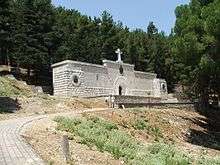Vido
Vido (Greek: Βίδο) is an island of the Ionian Islands group of Greece. It is a small island (less than a kilometer in diameter) at the mouth of the port of Corfu.
| Native name: Βίδο | |
|---|---|
 | |
| Geography | |
| Coordinates | 39°38′30″N 19°55′30″E |
| Administration | |
History
The island was known to the ancients as Ptychia (Ancient Greek: Πτυχία).[1] At some point, during the Peloponnesian war, Athenian generals used Ptychia in order to keep in custody some prisoners.[2]
Island was involved in Siege of Corfu (1798–99), Russo-Ottoman allies captured it from French on 28 February 1799.
During the First World War, the island of Corfu served as an island hospital and quarantine for sick Serbian soldiers following the epic retreat of the Serbian army and part of the civilian population through Montenegro and Albania in 1915 following the Austro-German-Bulgarian invasion of Serbia (see Serbian Campaign (World War I)). While the main camps of the recuperating army were on Corfu itself (a contingent was sent to Bizerte as well, and many of the civilian refugees were accepted by France), the sick and near-dying, mostly soldiers, were treated on Vido to prevent epidemics. In spite of Allied material help, the conditions of both the improvised medical facilities and many of the patients on the island resulted in a high fatality rate. Due to small area of the island and its rocky soil, it soon became necessary to bury the dead in the sea (by weighting the corpses with rocks to prevent them from floating). Over 5,000 people were buried at sea near the island of Vido.
A monument of gratitude to the Greek nation was erected at Vido by Serbs in the 1930s.
The waters around Vido island are sometimes referred to as the Blue Sea Tomb (Serbian: Plava Grobnica), after a poem written by Milutin Bojić after World War I.
- Serbian mausoleum
 Serbian World War I soldiers' mausoleum
Serbian World War I soldiers' mausoleum Interior of mausoleum
Interior of mausoleum Blue Graveyard memorial plaque
Blue Graveyard memorial plaque
See also
- Serbian Campaign (World War I)
- http://www.angelfire.com/super2/greece/ptychia.html
References
| Wikimedia Commons has media related to Vido. |